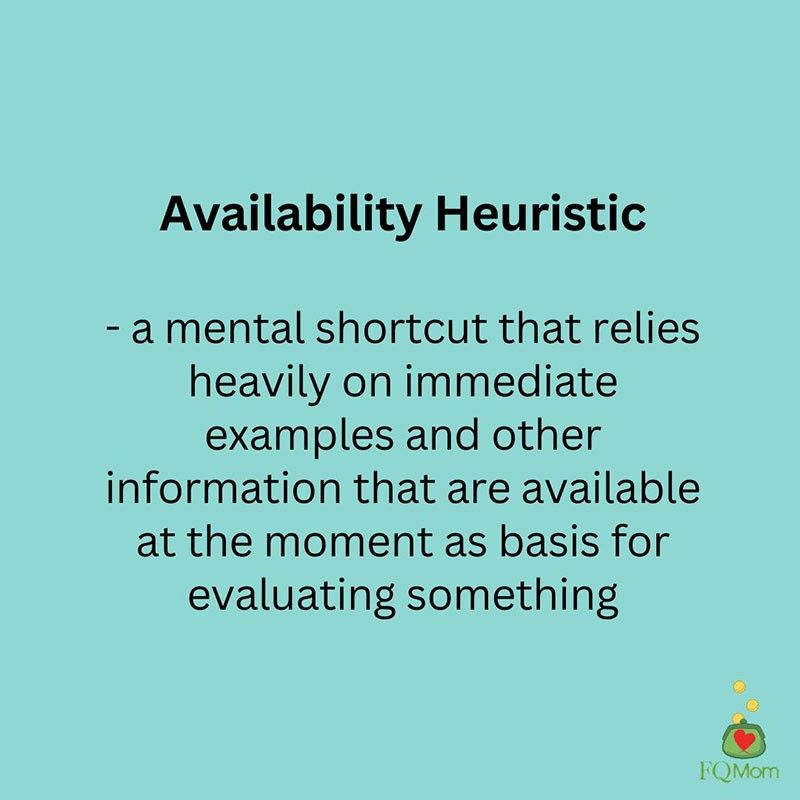Availability heuristic, closet and retirement

“Wala akong masuot!” That’s a common thought that usually enters our mind when we’re trying to figure out what to wear for an occasion or just trying to get dressed in the morning. Ironically, we say this as we stare at a closet that is so full of clothing items stacked on each other. Then, we buy new items and just figure out later on how to store them in this already tight closet. After buying new stuff, we discover that we already had something similar deep in our closet that we forgot about. It was not available in our sight and memory when we needed it.
Does this sound familiar?
How about these other examples?
1. After watching the news of a plane crash over and over again, you refuse to fly and would rather do long car drives.
2. After watching the movie Jaws, you refuse to go to the beach.
3. After seeing the stock market crash, you swear never to put your hard-earned money in this asset class, even for your long-term retirement investment.
All of the above examples, including the purchase of new clothing items are behaviors that exhibit availability heuristic. This is a mental shortcut that relies heavily on immediate examples and other information available at the moment as basis for evaluating something.

There are three things that push us to this cognitive bias which distort our understanding of risks and other important factors. These are:
1. We misjudge the frequency and magnitude of events that happen recently.
2. We have limited memory that makes the recent occurrence weigh more heavily.
3. We remember things better when they come in a vivid narrative.
If you’d rather do very long car rides than take the plane, do you know the odds of dying in a plane crash versus a car crash? According to a research by Harvard University, your odds of being in a plane accident is one in 1.2 million, and the chances of that accident being fatal are one in 11 million. On the other hand, your chances of dying in a car crash is one in 5,000. So, you have a higher chance of dying on your way to the airport riding a car than dying in the plane ride.
On the matter of totally avoiding going to the beach because of shark attacks, the odds of being attacked and killed by a shark are one in 3.75 million. Sharks should be more afraid of humans because while there are 70 to 100 shark attacks worldwide per year with five to 15 resulting in death, over a million sharks are killed every year by humans to make shark fin soup and other traditional medicine.
On the third example of not investing in stocks, I know someone whose previous job gave him a traumatic experience, losing big time in the stock market and also losing face because it was his job, so he now refuses to invest in this asset class. The same is true for investors who started investing before the Covid-19 pandemic. They may have sold their positions and swear not to touch this asset class anymore, even if over two centuries of historical records show that it provides the highest return in the long run.
All of these tragic stories leave vivid memories in our emotional Emong side, our limbic brain. These are the ones we easily retrieve when we make important decisions, not the cold statistics that can help us put things in their proper perspectives. Consequently, we avoid plane rides, beaches, investing in the stock market just to avoid these disasters.
What is the more common disaster?
Let me tell you about a more common disaster. It is the disaster of not being able to save and invest in a systematic way that will leave you ill-prepared for retirement as you approach 60!
According to the survey published in the website of the Commission on Filipinos Overseas, eight out of 10 are not saving enough for retirement. On the other hand, the Global Aging Institute and Pru Life UK survey shows that 90% of Filipino workers worry about being poor upon retirement. Now you can easily compute for the odds of an unprepared retirement disaster!
Here’s the difference. The disastrous effects of calamities such as plane crashes, shark attacks, stock market crashes, earthquakes, covid, etc. are easily seen and experienced, so we become cautious (sometimes way too cautious) to avoid them. On the other hand, the disastrous effects of unprepared retirement cannot be seen and felt after you miss out on paying yourself first and investing accordingly for your future self.
But here’s good news. While we cannot predict and prevent calamities such as market crashes, plane crashes, shark attacks, covid, etc., we can predict and prevent this more common calamity called disastrous retirement.
Out of sight out of mind = Availability heuristic
Let’s be aware of this behavioral bias called availability heuristic in order to make better decisions.
On the lighter matter of thinking that you don’t have anything to wear due to improper storage of clothes and in effect, suffer from availability heuristic, I have something for you on Friday. It’s the first of our House Tour + Behavioral Biases Series. Join me in my Closet Tour + Availability Heuristic. We even have a bonus part where Issa Reyes of Neat Obsessions teaches us how to fold when packing for a trip.

ANNOUNCEMENTS
1. Take the FQ test now to know where you are in your FQ journey!

2. Grab your copy of the FQ books.

3. See you on Friday for our Closet Tour + Availability Heuristic
ATTRIBUTIONS
1. For statistics on plane versus car crashes - https://simpleflying.com/how-safe-is-flying/#:~:text=Your%20odds%20of%20being%20in,rest%20of%20our%20guides%20here!
2. For statistics on shark attacks - https://worldanimalfoundation.org/advocate/shark-attack-statistics/
3. For statistics on Filipinos and saving - PrulifeUK.com.ph
This article is also published in FQMom.com.
- Latest




























